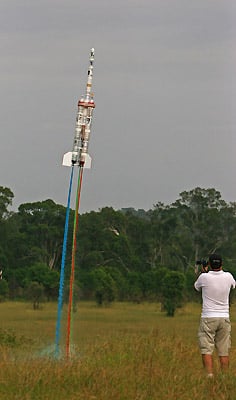The podcast version for this interview is available, please check it out (contains detailed show notes).
A couple of months ago, we drove out in the open plains of Sydney’s west to watch members of the NSW Rocketry Association launch their rockets.
Here’s some snapshots from that event:
And a video from a launch:
There, I met George Katz, an Electrical Engineer and a water rocket man.
George, after a career in electrical and software engineering making robots and video games, found his calling in designing and building rockets like this one:

What propelling this rocket is water and pressurised air.
In this interview, George talks about his early years as an engineer at University making robots, then as a software engineer making games for the Playstation, and how he became fascinated by rockets and the science and engineering of rocketry.
We spend a lot of time discussing water rocket engineering, and the process that George goes through when he designs and tests a new rocket.
Here is George’s bio, in his own words:
I’ve loved making things ever since I can remember. When I was young I used to make paper models of all kinds of things, until my parents bought me a 2 transistor radio kit. From that point I was interested in all things electronics. I studied electronics in high school and later completed my Degree in Computer Engineering from UNSW.
I enjoyed the course because it combined electronics with software and basically got computers interacting with the real world. There I also became interested in robotics and built a number of research robots for my thesis and for the AI department for other students to use. After university my day work mostly focuses on developing software for various companies, but electronics remains my hobby.
About 13 years ago I saw an episode of Mythbusters that featured water rockets. Searching on line I discovered a whole world of DIY makers that made rockets and posted instructions on how to do that. I talked to dad the next day and within 3 hours we had built a launcher and launched our first rocket in the back yard. From that point on we were hooked on building ever more complex and higher performing rockets. We also joined the local rocketry club (NSWRA) which opened a whole new world to us of like minded individuals with a lot of experience in the field and we’ve been able to learn a great deal from them.
To this day we still very much enjoy the engineering challenge of building and flying rockets. I get to use my electronics knowledge for rocketry payloads and ground launch equipment. Though we occasionally fly solid propellant rockets, our passion still is building water rockets. My dad has a mechanical engineering background and has designed scuba equipment for most of his career, so designing compressed air equipment is a good fit for the hobby. Both of my teenage boys are also a great help with all aspects of the hobby. We try to share our experiences as much as possible on line, and run a website with instructional videos as well as all launch and experiment reports.
We try to provide as much detail as we can so that others can learn from our successes and mistakes the same way people shared their knowledge when we were starting out.
Here some links you might find useful:
- Air Command Water Rockets
- Air Command Water Rockets on Youtube
- NSW Rocketry Association Inc.
- Dean’s Benchtop
- Thunda 2019
George Katz contact details:
- Email: katz.george [at] gmail.com
- Twitter: https://twitter.com/aircommand
